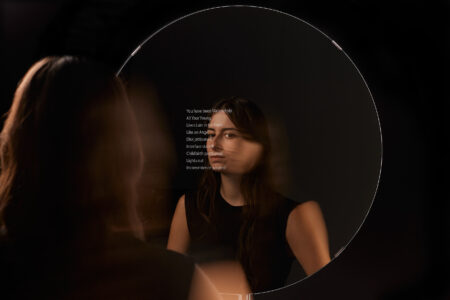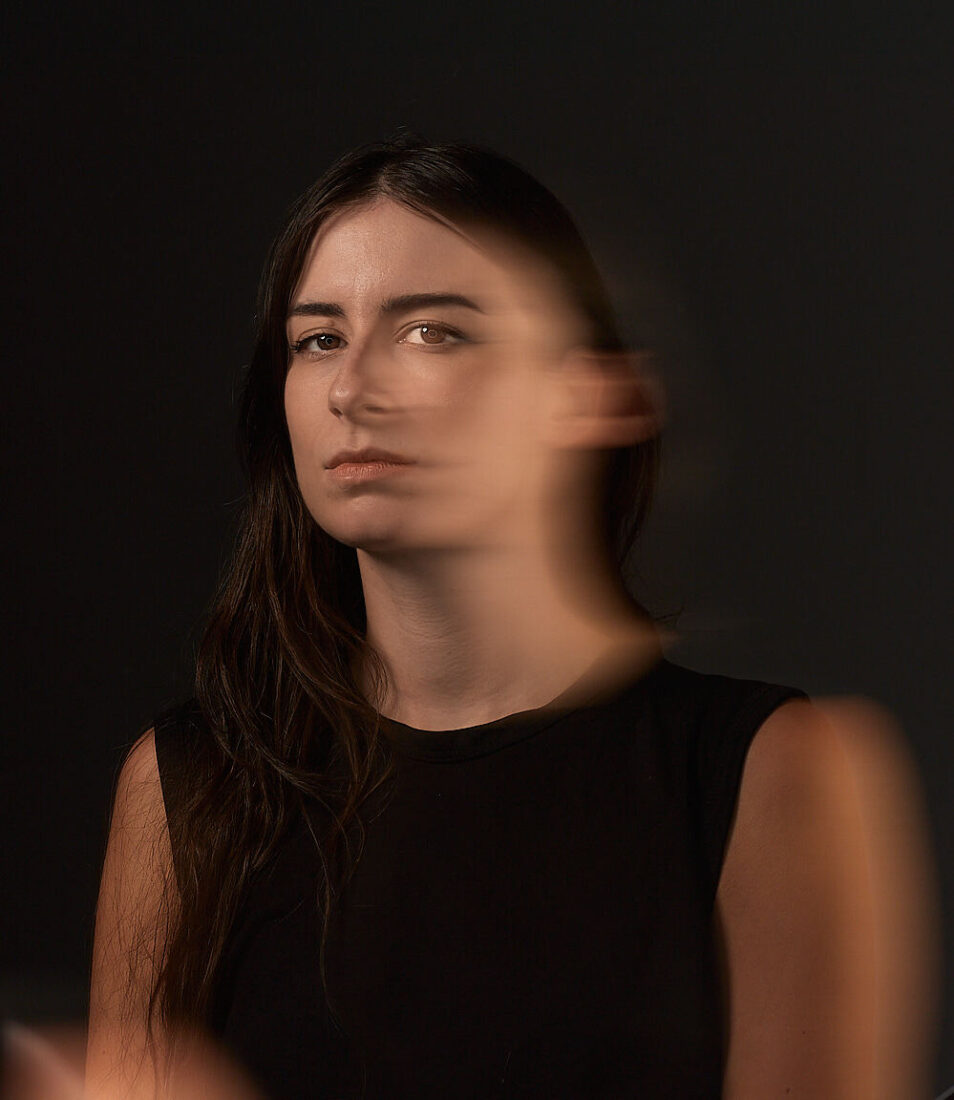AI systems are an ever-present constant of modern life. Real-time collaboration between human and machine is occurring across all aspects our existence. This reality is leading to ever increasingly sophisticated machine understandings of human emotion.
For artist, researcher and developer Nina Rajcic this changing technological landscape, and the ever increasing interactions between human and machine, offer elaborate opportunities for creative expression and affective computing.
Nina’s practice-based PhD, Posthuman Rituals, focuses on the design, development and implementation of new AI systems that foster meaningful and intentional relationships.

Nina Rajcic engages with her interactive work Mirror Rituals which features an AI mirror that creates a poem based on machine perception of the viewer’s emotion. Image provided by Nina Rajcic.
Adopting a posthuman framework, Nina’s research aims to better understand how AI technologies are becoming increasingly entangled into human life.
How much these everyday technologies rely on habitual and unconscious use is another of her primary concerns. In doing so, her work attempts to propose alternative kinds of relationships with technology, relationships based around ritual.
Nina’s practice-based research is being undertaken under the supervision of Prof Jon McCormack and Dr Vince Dziekan with the SensiLab at Monash University’s Faculty of IT.
Her PhD will be presented in three works, titled Ritual Series, which investigate a diverse range of human and machine interactions. Themes span facial recognition and emotional perceptions through to how machines process memories and how they can work with humans to actively co-construct memory.
The first of Nina’s works, titled Mirror Ritual, involves an affective interface that engages viewers in the co-construction of their emotion through the use of machine-generated text.

Image credit: Jon McCormack. Supplied by Nina Rajcic.
“My first work Mirror Ritual focused specifically on human emotion and how machines are trained and used to ‘measure’ facial expression,” according to Nina.
The work’s interface appears as a standard framed mirror. Interaction is triggered when a user is present. The embedded AI system then perceives the emotional state of the viewer, which informs the machine generated output that ultimately materialises as a poem on the surface of the mirror.
“Through reflection and introspection, the viewer co-constructs their emotional state with and through the machine,” Nina says.
Nina highlights this creative interaction as an example of the ways in which technology and AI have already become a part of our identities. “It shapes our behaviours and our realities, she says. “In the same way, Mirror Ritual engages viewers in this kind of entangled relationship, but strives for this relationship to be meaningful and carried out with intention.
Nina holds a Bachelors of Science, and a Masters of Physics (Theoretical Particle Physics) from The University of Melbourne, but art and creative practice have been long-time passions.
Her PhD has enabled her to bring those passions together, and practice based research has afforded exciting intellectual avenues. “I think I used to rely on theory a lot as a way of ‘knowing’ but recently through this PhD work I’ve come to value action and creative process as another complimentary way of knowing,” says Nina.
“I’m really interested in the combination of both theory and practice as an approach to research, and find that one always naturally unfolds from the other.”

Image supplied by Nina Rajcic.
It’s an approach that has led to public and industry recognition, Nina was named as a finalist in the 2022 Women in AI Awards.
Given the public nature of her artworks, Nina hopes they will lead people to question the current state of their relationships with technology, and perhaps even begin to imagine new kinds of technology that truly benefits or inspires them.
It is the creative aspects of her PhD that Nina finds most rewarding. “I feel that I am able to adopt my own unique perspective on an issue and present this to the wider academic field and the general public,” she says.
“Of course, the vulnerability that is required to do this was also a major challenge I had to overcome, and will always be something I grapple with,” Nina adds.
In terms of the advice Nina would offer to those considering a PhD, she suggests finding an arrangement that enables being able to explore your passions in the manner you want to.
“Just find a place where you are able to pursue what you’re interested in, especially where you have space to be creative and imaginative, offer new solutions to old problems,” she says.
“I think new researchers are able to engage with the discourse with fresh eyes, and this is so important especially in such fast evolving fields such as computer science and design.”
You can learn more about Nina Rajcic’s work at https://sensilab.monash.edu/people/nina-rajcic/ or by following her on Instagram @posthumanrituals

